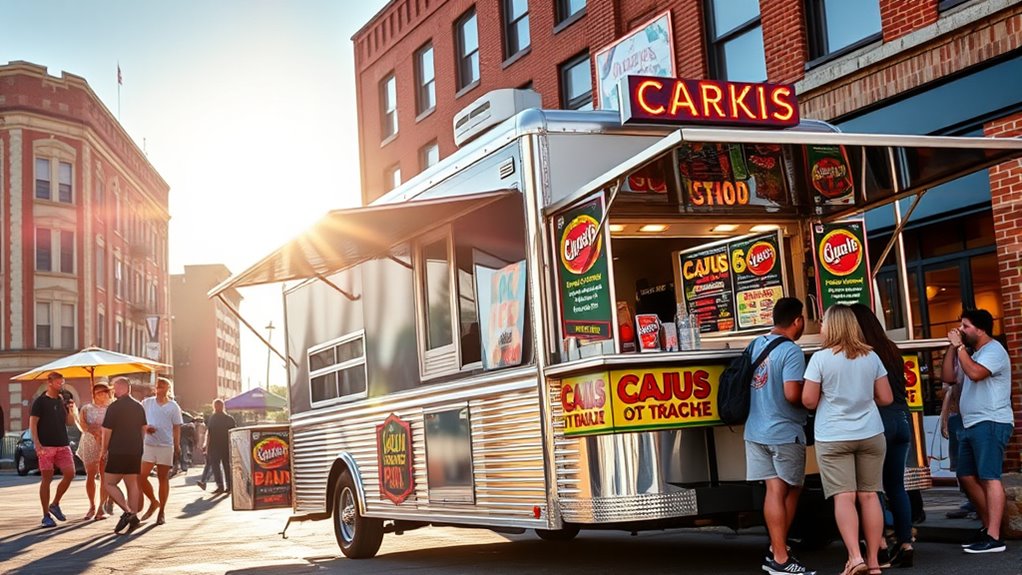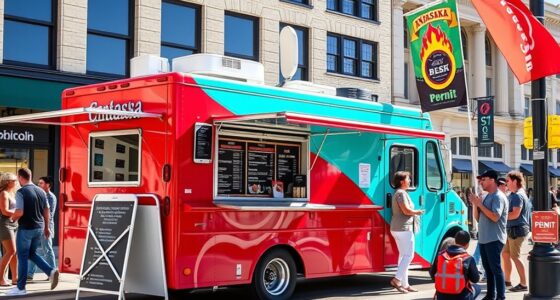To open a food truck in Shreveport, you’ll need a Food Truck Vendor’s License, a Business License, and location permits from the city, ensuring you’re operating in approved zones. You must meet vehicle safety standards, carry liability insurance, and comply with parking and safety regulations. Finding the right spot involves zoning rules and permissions, while your menu should follow health guidelines. Keep costs in check and stay compliant—more details will help you get started smoothly.
Key Takeaways
- Obtain necessary permits and licenses, including a Food Truck Vendor’s License, Business License, and location-specific permits from city authorities.
- Ensure vehicle compliance with safety standards, registration, insurance, and size restrictions before operating in approved zones.
- Select operating locations within permitted zones, secure property owner approval, and avoid prohibited areas like residential and school zones.
- Plan a compliant menu with proper food safety procedures, and leverage social media and local events for effective marketing.
- Maintain ongoing costs, vehicle maintenance, safety inspections, and compliance with city regulations to ensure smooth operations.
Navigating Permits and Licenses in Shreveport
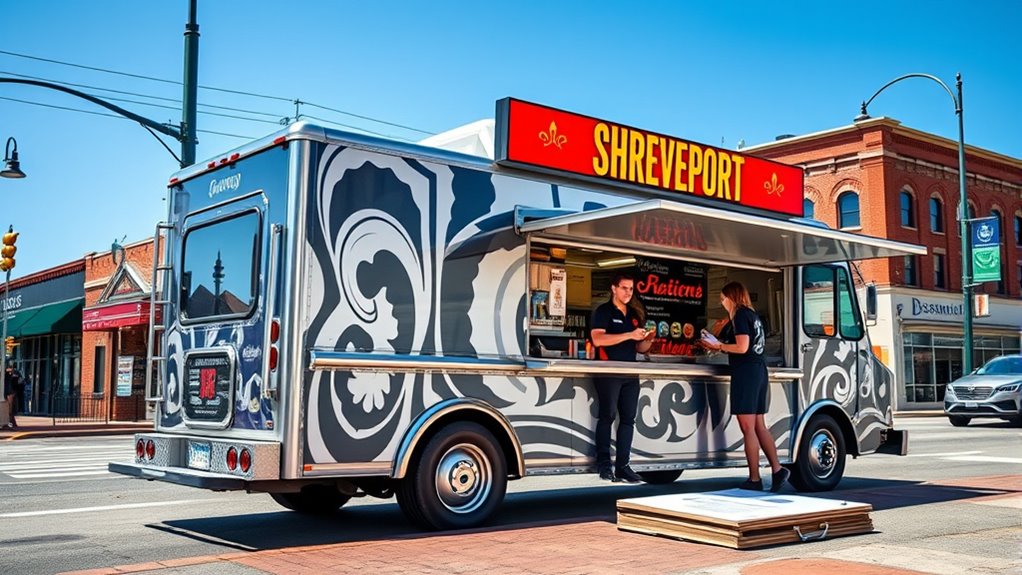
Managing permits and licenses in Shreveport is essential for legally operating your food truck. First, you need a Food Truck Vendor’s License, which is mandatory within city limits. You’ll submit proof of food safety certification and pass an annual health inspection by the Louisiana Department of Health. This license must be visibly displayed on your truck during operation and requires renewal each year. Additionally, health and safety permits, including food storage, sanitation, and fire safety inspections, are necessary to stay compliant. You’ll also need a separate Business License and Occupational License from the city, with annual renewals and a fee around $150. Finally, ensure your commercial liability and vehicle insurance meet the minimum requirements, and obtain property permissions if operating on private property. Proper lighting and signage also contribute to compliance and safety standards. Incorporating color accuracy considerations can help ensure your branding and vehicle signage remain clear and attractive under various lighting conditions.
Understanding Vehicle and Operational Standards
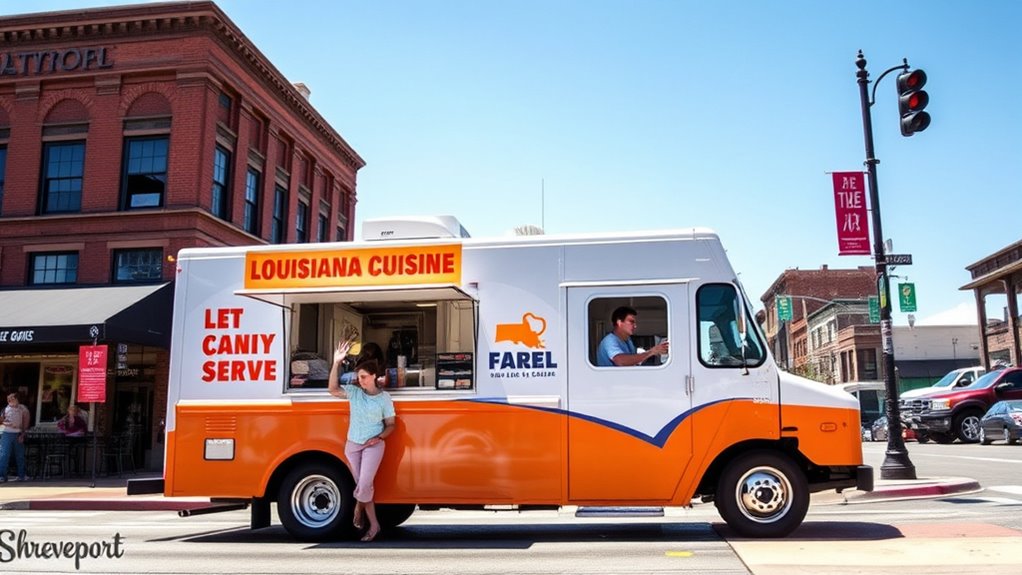
To operate legally, your food truck must meet specific vehicle safety standards and pass regular inspections. You also need to follow strict operational rules, like proper parking, waste disposal, and maintaining required permits. Understanding these vehicle and operational standards guarantees you stay compliant and avoid penalties while serving in Shreveport. Additionally, obtaining the necessary permits such as the City-Issued Food Truck Permit, Occupational License, and approvals from the State Department of Health and Hospitals as well as the Fire Department ensures your vehicle complies with all safety and health regulations. Ensuring your operations adhere to environmental impact considerations can further demonstrate responsible business practices and may be required by local ordinances.
Vehicle Safety Standards
Ensuring your food truck meets vehicle safety standards is essential for legal operation and public safety in Shreveport. You must pass regular safety inspections covering brakes, lights, tires, and fire safety equipment. These inspections confirm your truck’s mechanical soundness and fire suppression system functionality. Before opening, your vehicle needs proper registration with the Louisiana DMV, valid driver’s licenses, and proof of insurance—minimum $500,000 liability coverage that names Shreveport. It is also important to stay updated on any changes to vehicle safety standards to maintain compliance. Here’s a quick visual reminder:
| Vehicle Standards | Operational Standards |
|---|---|
| Registration & documentation | Parking & traffic law compliance |
| Safety inspections (annual) | Displaying permits visibly |
| Size & load limits (max 26 ft long) | Adhering to parking restrictions |
| Fire safety checks | Proper operation within city zoning |
Operational Compliance Requirements
Understanding your vehicle and operational standards is essential for running a compliant and successful food truck in Shreveport. You need to meet health, safety, zoning, and waste management regulations to stay in good standing. Confirm your truck has the proper permits, including a Food Truck Vendor’s License and Business License, renewed annually. You must pass health and fire safety inspections, with your layout approved beforehand. Be aware of zoning restrictions, such as distance from schools and residential areas, and secure property owner consent for operating in designated zones. Maintain proper waste disposal by providing trash receptacles and cleaning your area thoroughly. Additionally, carry liability insurance, and ensure your drivers hold valid Louisiana driver’s licenses. Staying compliant helps prevent fines and operational disruptions.
Finding Approved Locations and Operating Restrictions
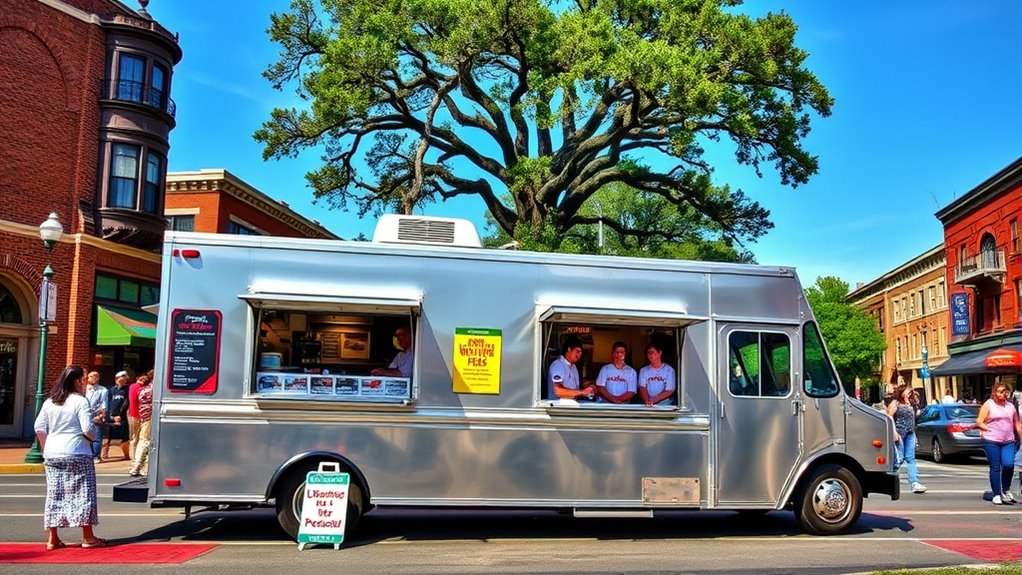
To find approved locations for your food truck, you need to focus on designated zones authorized by the city’s Zoning Administrator. You’ll also have to get your locations listed on a temporary use permit and follow any restrictions on operating hours or specific areas. Knowing which spots are off-limits, like residential zones or close to schools, helps ensure you stay compliant and avoid penalties. Additionally, over 2 BBQ trailers, trucks, and carts available for catering can sometimes be stationed in permitted areas, provided all regulations are followed. Incorporating creative practice into your planning can help you develop innovative approaches to selecting optimal locations and marketing your food truck business.
Designated Operating Zones
Food trucks in Shreveport are only allowed to operate within specific zoning districts, primarily in commercial and industrial areas, as well as properties zoned as OS (Open Space) or IC (Institutional Campus). You must verify that your chosen location falls within these approved zones, which are detailed in the city’s Use Matrix. Even in permitted zones, you need property owner permission in writing before operating. Additionally, you must adhere to distance restrictions from restaurants, schools, and residential areas to prevent conflicts. Compliance with parking rules is essential, including restrictions on blocking sidewalks or driveways. Regularly review local ordinances to ensure your location remains compliant and avoid revocation of your license or permits. Proper documentation and adherence to these zones are crucial for legal operation. Understanding zoning regulations is essential to ensure your food truck operates legally and avoids penalties.
Restricted Area Prohibitions
You must carefully select your operating locations to avoid prohibited areas around sensitive sites and comply with local regulations. Food trucks aren’t allowed near schools, residential zones, or existing restaurants to prevent safety issues, noise, and unfair competition. Certain parks and public spaces may also restrict truck operations to protect public use. State and local laws require adherence to vehicle registration, driver licensing, health inspections, fire safety, and insurance standards. You can only operate on approved commercial, industrial, or institutional properties with property owner approval; residential and agricultural zones are off-limits. Additionally, noise, waste disposal, and parking regulations must be followed to guarantee safety and community harmony. Violations can result in fines, license revocation, or legal action, so choose your locations carefully and stay compliant. Zoning restrictions are a crucial factor to consider when selecting suitable areas for your food truck operation.
Location Approval Process
Before operating your food truck in Shreveport, you must obtain explicit approval from the Zoning Administrator for each location. This process guarantees your chosen spots meet city regulations and safety standards. You’ll need to submit detailed information about your intended locations, which must be approved individually. Approved locations are typically listed in your permit documents. The approval process involves coordination with municipal departments like zoning and health, verifying compliance with city codes. Ensuring your locations comply with essential oils for safety and health is also important to maintain proper hygiene standards.
- Locations must meet specific zoning and safety requirements.
- Temporary permits require specifying all operating spots.
- Moving between locations needs prior approval and notification.
- Trucks must return to a compliant commissary daily.
- Operating restrictions, like hours and distances, depend on approved locations.
Planning Your Menu and Ensuring Food Safety

Effective menu planning for a food truck in Shreveport requires balancing local tastes, ingredient availability, and operational efficiency. You need to define your menu clearly and submit it as part of your MFE plan for Louisiana Department of Health review. Document preparation and storage methods for each item to pass health inspections, guaranteeing proper thawing, cooking, cooling, and reheating processes. Incorporate specialized equipment for hot and cold foods to maintain proper temperatures. Stay adaptable by adjusting your menu seasonally to reduce costs and enhance quality. Remember, your truck must operate in conjunction with a licensed commissary for food prep and storage, follow strict sanitation protocols, and ensure all staff are trained and certified in food safety. Proper planning now prevents issues during inspections and maintains food safety standards. Additionally, understanding food safety protocols can help you implement best practices for sanitation and handling, ensuring compliance with health regulations.
Developing Effective Marketing and Business Strategies
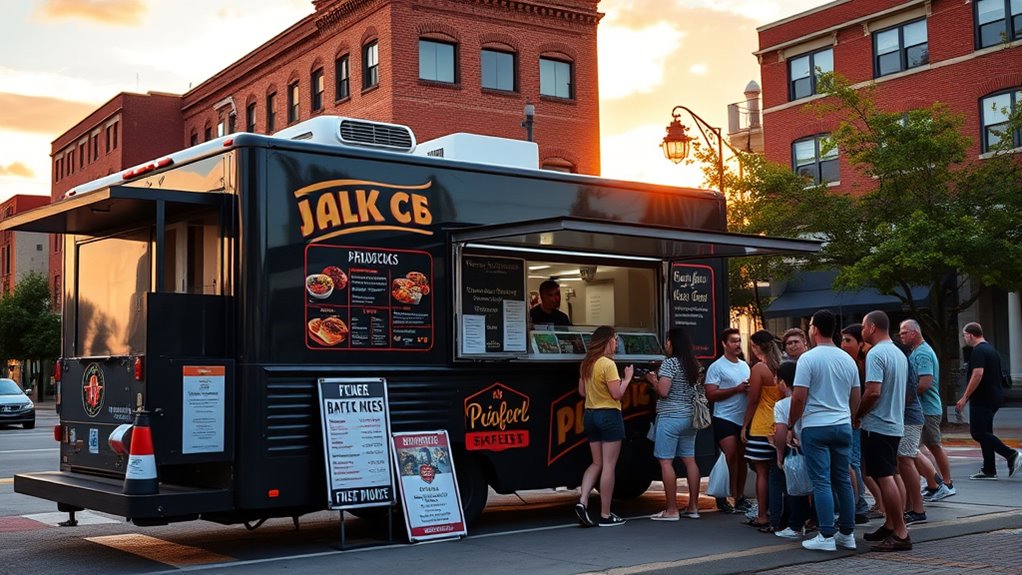
Developing strong marketing and business strategies is essential for standing out in Shreveport’s competitive food truck scene. You need to leverage social media effectively—Facebook is key, with 75% of truck owners using it to promote their business. Campaigns can boost sales by 20%, and active engagement increases customer spending by 15%. Also, consider participating in local events and festivals; about 80% of trucks do at least three annually, building brand loyalty and foot traffic. Implement loyalty programs, which can raise repeat visits by 30%, and utilize data analytics to optimize locations and offers. Additionally, maximizing space and organization can improve operational efficiency and customer experience. Finally, align your marketing with local demographic trends, focusing on Millennials and Gen Z’s preferences for sustainability, variety, and experiential dining. These strategies will help you attract, retain, and grow your customer base effectively.
Managing Costs and Ensuring Compliance
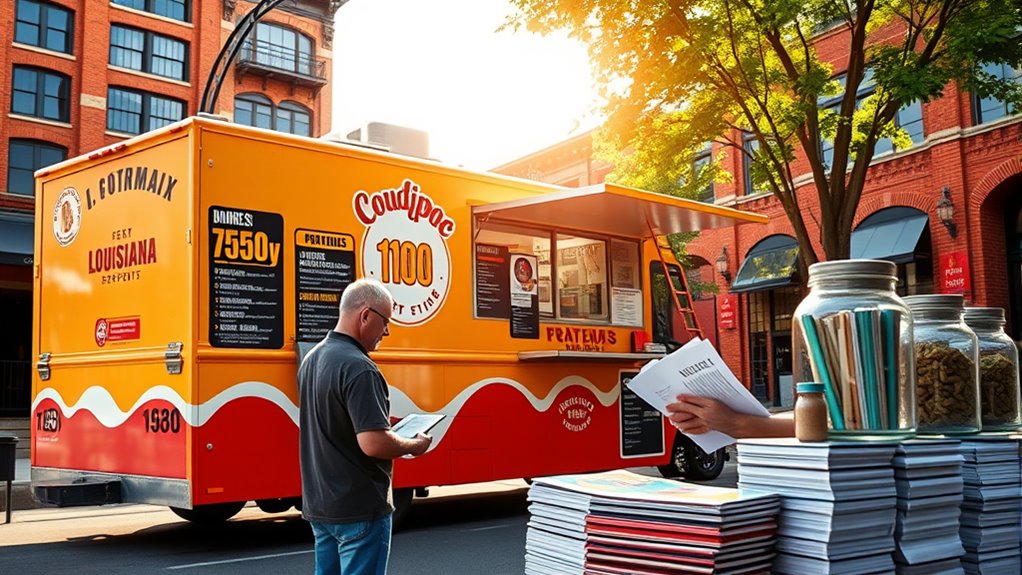
Managing costs and ensuring compliance are essential for keeping your food truck business profitable and operating smoothly in Shreveport. You’ll need to budget for annual renewal fees for your Food Truck Vendor’s License and business license, along with costs for liability and vehicle insurance. Operating only in permitted zones helps avoid fines and shutdowns, saving you unexpected expenses. Compliance costs include maintaining food supplies, cleaning, vehicle inspections, and safety equipment. You must follow vehicle registration rules, adhere to size limits, and keep licenses visible. Zoning regulations require operating in approved zones with proper permissions and maintaining safe distances from sensitive areas like schools and residences. Regularly passing health and fire safety inspections is crucial to avoid citations. Staying compliant minimizes legal risks and keeps your business running smoothly. Additionally, understanding the Weight of Wind Turbine Blades can inform investments in sustainable practices that may benefit your business in the long run. Ensuring your browser is up-to-date can also prevent technical issues that may disrupt your online permit applications and documentation processes.
Frequently Asked Questions
How Long Does the Permit Approval Process Typically Take in Shreveport?
You’re wondering how long the permit approval process takes in Shreveport. Typically, it can take several weeks, depending on how complete your application is and how quickly inspections are scheduled and passed. Missing documents or failed inspections can extend this timeline. Since multiple agencies are involved, delays are common. To avoid setbacks, submit all paperwork early, guarantee everything is accurate, and prepare for a multi-week wait before approval.
Are There Specific Zoning Restrictions for Mobile Food Vendors in Historic Districts?
It’s a coincidence that historic districts often have strict zoning rules for food trucks, and you need to pay attention. In Shreveport, you can’t operate a food truck in these areas without special permissions, like a rezoning or variance. You must stay clear of residential zones and maintain distances from restaurants. Operating on commercial lots with landowner approval is essential, and compliance with noise, waste, and parking laws is a must.
Can I Operate a Food Truck at Private Events Without City Permits?
You might be able to operate a food truck at private events without city permits if it’s considered off-site catering and serves only invited guests. However, you should verify with local authorities to confirm your specific situation. Even at private events, you must follow health and safety regulations and obtain necessary permissions from property owners. Always check zoning restrictions and ensure adherence to avoid fines or shutdowns.
What Are the Penalties for Operating Without Proper Licenses in Shreveport?
If you operate without proper licenses in Shreveport, you risk hefty fines starting at $100, with penalties increasing for repeat offenses. You could face immediate shutdown, license suspension, or revocation, along with potential legal costs. Enforcement officers monitor compliance, and failure to display permits or follow health and zoning rules can lead to citations. Noncompliance jeopardizes your ability to keep operating legally, so it’s vital to secure all necessary permits beforehand.
Are There Grants or Financial Assistance Programs for New Food Truck Businesses?
Did you know that most small businesses, including food trucks, fail due to funding issues? Currently, there are no specific grants or financial assistance programs directly for new food trucks in Shreveport. You’ll need to explore other options like small business loans, microloans, or private funding. While local government grants are limited, partnering with organizations for events or regional tourism grants might help offset some costs.
Conclusion
Starting your food truck journey in Shreveport is like planting a seed—you’ll need the right permits, location, and menu to help it grow. Stay compliant, manage costs wisely, and craft a marketing plan that stands out. With dedication and attention to detail, you’ll turn your truck into a rolling feast that captures hearts and taste buds alike. Remember, success isn’t just about the destination; it’s about enjoying the ride along the way.
